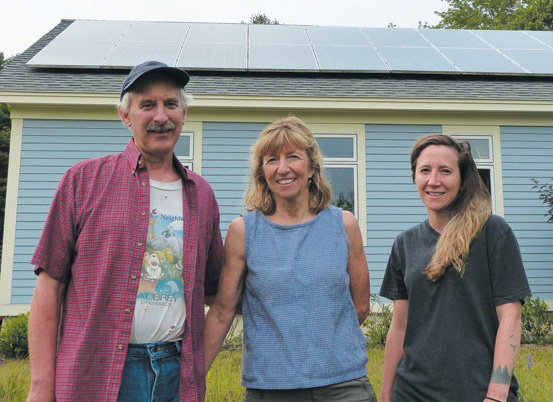BRUNSWICK — A group of Brunswick families is asking the state’s top court to overturn a solar panel tax, arguing that the town placed an arbitrary taxable value on the panels that is unconstitutional and will hold back the growth of solar power in town.
The seven families have appealed an October Brunswick Board of Assessment Review decision to uphold a per-panel tax assessment to the Maine Supreme Court. The per panel tax — roughly $200 per panel, decreased from an initial $500 — is arbitrary, unconstitutional and is a deterrent to solar power growth in town, the families argue.
According to Brian Marshall of the Verrill Dana law firm, who is representing the group, Brunswick did not tax solar panels until the town’s revaluation in 2017. Since KRT Appraisal, the company conducting the revaluation, had no formula for how solar systems should be valued, then-assessor Cathleen Jamison “decided to impose a $500 per panel assessment on all solar panels within the Town … based solely on ‘online research’ that included no Maine-specific publications,” the brief states.
After some solar panel owners sought abatements, the per-panel assessment was reduced to $200 apiece, an amount given to all property owners with solar installations. For the seven property owners Marshall is representing, abatements ranged from $82 to $174, the Times Record reported in July.
Aside from what Marshall described as an unclear methodology, Marshall argues that there is not enough evidence to support the claim that solar panels add any resale value to a home. “There are a whole host of reasons” to get solar panels, he argued, but home value is not one of them.
Brunswick has supported solar energy since the Solarize Brunswick campaign in 2016, which brought at least 65 new systems to town, but Marshall said when the tax was introduced after the revaluation the next year, “A lot of people felt kind of betrayed.”
“Probably there is a way to do this legally,” he said of taxing the panels. “More and more homes with solar panels are going to be coming on the market and we can measure the impact” this has on the values, “but we need evidence first,” he said, calling the move “premature.”
Instead of basing the values on previous sales, they are instead based on the income, or cost reductions, they generate.
With a flat rate tax, though, there are still too many variables, Marshall said, like the age and life expectancy of a system or even where the panels place, effects how much the system will generate; not something a flat rate can determine.
While many homes have other cost-saving, energy-efficient measures in place, Marshall said solar panels are the only measure taxed in the “same, discrete way.” In an earlier interview though, Jamison refuted that, saying other energy-efficient components are included in the construction details of a home.
“So if you have a home that has upgraded windows and newer systems, then it’s going to have a different assessed value than one that does not,” she said. “Some of the items like generators and in this case solar panels, get priced out separately from the home.”
Solar panels are easy to see and therefore easy to tax, Marshall argues, but “ease of taxing is not a sufficient reason for taxation.” An assessor needs to “capture all of a home’s energy performance matrix to create a more equitable taxation system,” he said.
According to Stephen Langsdorf, Brunswick’s attorney, however, in a mass appraisal like the one the town underwent in 2017, “it is incumbent upon the taxpayer to request an abatement” if there are specific reasons they feel the cost is unreasonable, not just to make a blanket complaint. They reduced the cost significantly from $500 to $200, he said, a relatively low amount compared to some towns like in York, which settled on $400 per panel in a ruling last week, a decrease from $1,000.
The town’s position remains that the assessment was “rational and reasonable,” Langsdorf said, adding that it is simply a question of following the law. Maine does not exempt solar panels from taxation, and with an associated value, they legally must be taxed, he said.
“Applicants are going out of their way to say it was arbitrary,” he said, “when the (assessor) used a value calculator promoted by ReVision Energy on its own website.”
“The argument that they add no value (to a home) is frivolous,” he added. “It’s clear to anyone with common sense that something that is going to reduce the cost of energy is going to be of value.”
While solar panels are not currently exempt, both parties agreed that with the new administration, that may change.
But for now, the seven families, who make up just a handful of the estimated 130 in town with solar panels, are concerned that this will be a deterrent for people interested in solar power.
“For something with a return on investment over such a long period of time,” Marshall said, even a small tax could be a problem.”
When Jamison retired at the end of the summer she was replaced by Topsham’s Justin Hennessey, who upheld her initial decision. However, Hennessey recently resigned, according to the Brunswick assessor’s office and it is unclear if this will affect the proceedings in any way.
Langsdorf said he expects the court will issue a ruling in late spring or early summer.
hlaclaire@timesrecord.com
Send questions/comments to the editors.



Comments are no longer available on this story